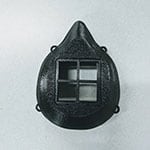Mask making fights COVID-19 spread
Students, staff, faculty unite in efforts to protect health care workers
With the country falling short of protective masks for nurses and doctors, many Central Michigan University students and faculty are jumping in to help fill the void.
Michael Reuter — director of technology operations in the College of the Arts and Media and College of Education and Human Services — and students and staff working remotely are using 3D printers at CMU’s Makerbot Innovation Center to make reusable rigid versions of N95 respiratory masks to be fitted with small replaceable filters.
 Scott Kinsley, assistant manager of technology and academic computing, is overseeing the printing.
Scott Kinsley, assistant manager of technology and academic computing, is overseeing the printing.
Reuter consulted with the Michigan Health Improvement Alliance and learned of the need to supplement the mask-making efforts of a Saginaw-area automotive plant that is producing 30 of the special plastic masks a day. Each mask takes roughly 4.5 hours to print.
“We should be able to add 50 to 60 a day to that number at our Makerbot center,” Reuter said. “We will continue printing masks as long as there is a need.”
The hard-shell reusable masks allow medical personnel to get six to 10 uses out of a single cloth surgical mask by cutting them into smaller squares to insert into the hard shield. Users also can insert hospital-grade HEPA filtration material.

t the same time, Fashion Merchandising and Design students and faculty have banded together to empower groups of students and others to sew general surgical masks, starting with at least 70 yards of surgical fabric and elastic at the Center for Merchandising and Design Technology left over from a previous project.
Department Chair Tanya Domina, after speaking about the need for surgical masks with MiHIA, worked with Sue Wroblewski, CMDT lab coordinator, and senior Joshua Golden to start the effort.
With their support, Golden sketched out how to make the masks, put together instructions and sent them to upper-level fashion students and others, asking for sewing volunteers. Other FMD students, such as Haley Poste, were also sewing and creating their own groups.
“We found anybody who was willing to sew and sent them the material,” Wroblewski said, adding that all were instructed to properly disinfect their work areas.
Domina said at least 12 fashion design students now are making the protective masks in their apartments and homes.
MiHIA plans to distribute the masks to areas of need.